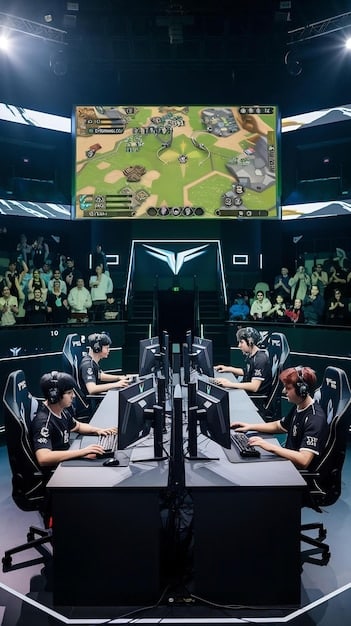Esports Career Paths in the US: Explore Options Beyond Pro Gaming

Esports Career Paths in the US: Beyond Pro Gaming – What are the Options? offers numerous opportunities beyond playing professionally, including roles in coaching, team management, content creation, broadcasting, and event organization, providing diverse avenues for individuals passionate about esports to build fulfilling careers.
The allure of esports often centers on the dream of becoming a professional gamer, achieving fame and fortune through competitive play. However, the reality is that only a tiny fraction of aspiring players reach the pinnacle of professional gaming. Fortunately, the esports industry is vast and rapidly expanding, offering a multitude of Esports Career Paths in the US: Beyond Pro Gaming – What are the Options? for individuals with diverse skill sets and interests.
Exploring Esports Career Paths Beyond Pro Gaming
While becoming a pro gamer is the most publicized path, the esports industry is a complex ecosystem that requires a wide range of professionals. These roles support the pro players and the overall industry growth. Let’s delve into some exciting alternatives to professional gaming.
Coaching and Analysis
Just like traditional sports, esports teams rely on skilled coaches and analysts to develop strategies, improve player performance, and gain a competitive edge. Coaches provide guidance, create training regimens, and offer invaluable support to players.
Team Management
Managing an esports team involves overseeing all aspects of the team’s operations, from scouting and recruiting players to handling finances and scheduling. Team managers are essential for ensuring the smooth functioning of the team and its success.

- Responsibilities of an Esports Coach: Player development, strategy formulation, and team leadership.
- Responsibilities of an Esports Analyst: Data analysis, opponent scouting, and performance evaluation.
- Key Skills: Leadership, communication, strategic thinking, and in-depth game knowledge.
- Career Outlook: Growing demand for experienced coaches and analysts as esports teams become more professional.
The rise of esports has created opportunities for individuals with a passion for games and a knack for leadership, strategic thinking, and analytical skills. Esports coaches and analysts play a vital role in helping teams reach their full potential.
Content Creation and Streaming
Content creation and streaming have become integral parts of the esports landscape, providing engaging content for fans and generating revenue for individuals and organizations alike. These roles offer creative outlets and opportunities to connect with a global audience.
Becoming an Esports Streamer
Esports streamers broadcast their gameplay live on platforms such as Twitch and YouTube, entertaining viewers with their skills, personality, and commentary. Successful streamers attract a large following and can earn revenue through subscriptions, donations, and sponsorships.
Esports Journalism and Writing
The esports industry needs skilled journalists and writers to cover tournaments, interview players, and create insightful content about the games and the community. Esports journalism offers a chance to combine a passion for gaming with a career in writing and reporting.
- Skills for Content Creation: Video editing, graphic design, and social media management.
- Skills for Esports Journalism: Writing skills, game knowledge, and ability to conduct interviews.
- Platforms: Twitch, YouTube, Twitter, and esports dedicated news sites.
- Monetization: Sponsorships, ad revenue, subscriptions, and donations.
The demand for esports content is high, and individuals with creative skills and a deep understanding of the games have a chance to succeed as streamers, journalists, and content creators. These roles contribute to the growth and popularity of the esports industry.
Esports Event Management and Production
Esports events require meticulous planning, organization, and execution. Event managers and production teams work behind the scenes to ensure that tournaments, leagues, and other esports events run smoothly and provide a captivating experience for players and fans.
Roles in Event Management
Event managers oversee all aspects of esports events, from venue selection and logistics to marketing and sponsorship. They coordinate with various stakeholders to create a seamless and memorable experience.
Roles in Production
Production teams are responsible for the technical aspects of esports events, including broadcasting, streaming, and stage management. They ensure that the event is visually appealing and technically sound.

The growing popularity of esports events has created a demand for skilled event managers and production professionals who can deliver high-quality experiences for players and fans alike. These roles are crucial for the success of the esports industry.
Esports Marketing and Sales
Esports organizations need skilled marketing and sales professionals to promote their brand, attract sponsors, and generate revenue. These roles are essential for the growth and sustainability of esports teams, leagues, and events.
Marketing Strategies in Esports
Esports marketing involves developing and implementing strategies to engage with fans, build brand awareness, and promote esports events and products. Marketing professionals use a variety of channels, including social media, content marketing, and influencer marketing.
Sales in Esports
Sales professionals are responsible for securing sponsorships, partnerships, and advertising deals for esports organizations. They work to generate revenue and build relationships with brands that want to reach the esports audience.
- Key Marketing Skills: Digital marketing, social media management, content creation, and data analysis.
- Key Sales Skills: Communication, negotiation, relationship building, and understanding of the esports market.
- Target Audience: Esports fans, brands, sponsors, and media outlets.
- Opportunities: Esports teams, leagues, event organizers, and gaming companies.
As the esports industry continues to grow, the need for skilled marketing and sales professionals becomes more critical. These roles play a vital part in driving the financial success of esports organizations and promoting their brand to a global audience.
Esports Law and Legal Counsel
The esports industry is becoming increasingly complex, requiring specialized legal expertise to navigate contracts, intellectual property, and other legal issues. Lawyers and legal counsel specializing in esports provide essential services to players, teams, and organizations.
Contract Negotiation
Esports lawyers assist players and teams with contract negotiations, ensuring that their rights are protected and that they receive fair compensation for their services.
Intellectual Property Protection
Legal counsel also advises esports organizations on protecting their intellectual property, including trademarks, copyrights, and other valuable assets.
The legal aspects of esports are constantly evolving, and the demand for specialized legal expertise is growing. Lawyers and legal professionals with a deep understanding of the esports industry will find ample opportunities to provide valuable services to players, teams, and organizations.
Game Development and Design within Esports
The creation of esports titles themselves is a career path often overlooked. Game developers and designers play a fundamental role in shaping the competitive landscape and ensuring the longevity of esports titles.
The Role of Game Designers
Game designers create the rules, mechanics, and overall structure of the game. For an esports title, balance and fairness are crucial, making the job even more critical.
The Role of Game Developers
Game developers bring the game designer’s vision to life, programming the game and ensuring it runs smoothly. Optimizing the game for performance is essential for competitive play.
- Technical Skills: Programming languages, game engines, and software development tools.
- Design Skills: Understanding of game mechanics, balance, and player psychology.
- Industry: Gaming companies, esports organizations, and independent studios.
- Impact: Shaping the future of esports through innovative game design and development.
Game developers and designers are at the heart of the esports experience. Their work directly impacts the quality, competitiveness, and entertainment value of esports titles.
| Key Area | Brief Description |
|---|---|
| 🎮 Pro Gaming Alternative | Coaching, management, content, events, marketing, legal, and development. |
| 💼 Coaching & Analysis | Strategy development and performance improvement for esports teams. |
| 📣 Content Creation | Streaming, journalism, and video creation for esports. |
| ⚖️ Esports Law | Specialized legal services to support esports organizations and players. |
Frequently Asked Questions (FAQ)
▼
While not always mandatory, a degree in fields like marketing, communications, computer science, or business can significantly enhance career prospects in esports. Specific certifications relevant to roles like coaching or event management are also beneficial.
▼
Start by volunteering at local esports events or joining college esports clubs. Internships with esports teams or organizations are excellent opportunities. Building a personal brand through streaming or content creation can help showcase your skills.
▼
Earning potential varies greatly. Coaches and analysts can earn competitive salaries, especially with successful teams. Marketing and sales roles often offer commission-based income, while streamers and content creators rely on subscriptions, donations, and sponsorships. Legal counsel can command high hourly rates.
▼
Communication, teamwork, and problem-solving skills are crucial. Adaptability and a willingness to learn are essential due to the fast-paced nature of the industry. Technical skills relevant to specific roles, such as data analysis or video editing, are also important.
▼
The esports job market in the US is experiencing substantial growth. As the industry matures and becomes more professional, there is an increasing demand for skilled individuals in various roles beyond pro gaming. This trend is expected to continue in the coming years.
Conclusion
In conclusion, while the dream of becoming a pro gamer is captivating, the esports industry offers a diverse range of Esports Career Paths in the US: Beyond Pro Gaming – What are the Options? that cater to different skill sets and interests. From coaching and team management to content creation and event organization, there are plenty of opportunities for individuals passionate about esports to build fulfilling and successful careers.





